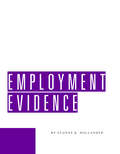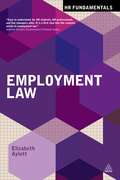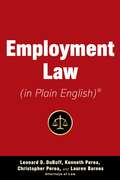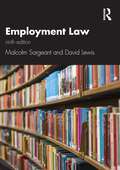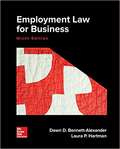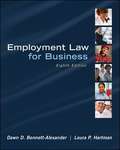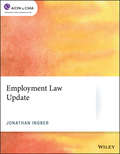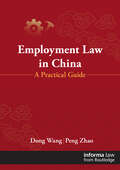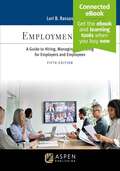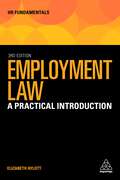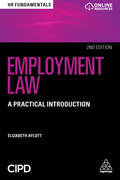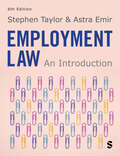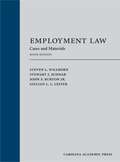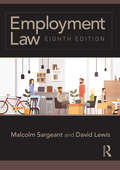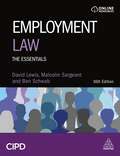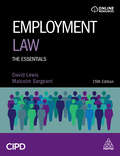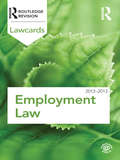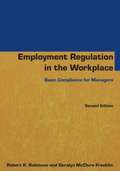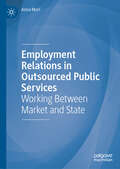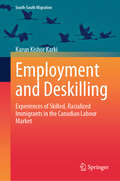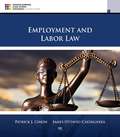- Table View
- List View
Employment Equity in Canada
by Carol AgocsIn the mid-1980s, the Abella Commission on Equality in Employment and the federal Employment Equity Act made Canada a policy leader in addressing systemic discrimination in the workplace. More than twenty-five years later, Employment Equity in Canada assembles a distinguished group of experts to examine the state of employment equity in Canada today.Examining the evidence of nearly thirty years, the contributors - both scholars and practitioners of employment policy - evaluate the history and influence of the Abella Report, the impact of Canada's employment equity legislation on equality in the workplace, and the future of substantive equality in an environment where the Canadian government is increasingly hostile to intervention in the workplace. They compare Canada's legal and policy choices to those of the United States and to the UN Convention on the Rights of Persons with Disabilities, and examine ways in which the concept of employment equity might be expanded to embrace other vulnerable communities. Their observations will be essential reading for those seeking to understand the past, present, and future of Canadian employment and equity policy.
Employment Evidence
by Eugene HollanderEmployment Evidence This strategic guide to admission and exclusion gives you foundations, objections, responses, tactics, jury instructions, motions in limine, and supporting authority for all your evidence battles in employment cases. You'll get everything you need to win your battles over EEOC letters, unemployment records, arbitration decisions, past sexual conduct, after-acquired evidence, prior acts of disparate treatment, corrective action policies, disciplinary records, personnel files, defendant's net worth, plaintiffs' medical and psychological history and exams, undue hardship, BFOQs, and much more. Anticipate and circumvent problems in admitting your evidence and exclude/limit what the opposition throws at you. Designed for quick reference with centerfold index, tabbed dividers, shaded tips, boxed objections, argument checklists, tactics by part, and over 750 cases divided by admitting/excluding. In-depth treatment of rules, definitions and distinctions. Nearly every topic supported with multiple forms. This in-depth, easy-to-use, practical book will be indispensable in your employment cases.
Employment Law
by Elizabeth AylottEmployment Law is a practical guide to understanding and applying the law effectively at work. Tailored to the needs of practitioners it offers a complete overview of the fundamentals of employment law, examining its importance for an organization, its employees and the HR function. Using a combination of practical tools, assessments, scenarios and case studies from best practice it will build your legal knowledge of key areas including immigration, employing temporary staff, changing contracts, discrimination, equal pay, family rights, redundancy and much more. By aligning compliance to legal requirements with the strategic objectives of your organization it will equip you with the crucial skills and knowledge you need.
Employment Law (In Plain English)
by Leonard D. DuBoff Christopher Perea Kenneth A. Perea Lauren BarnesEmployment Law (in Plain English)®provides both employers and employees the information they need in order to understand the law as it relates to their working relationship. This helpful guide will enable readers to identify and prevent many of the issues which can and do occur in the employment context, thus saving everyone valuable time and money and establishing a stronger workforce. While this book is not intended to replace the reader&’s employment lawyer, it will provide the ability to assist one&’s lawyer in litigation should the need arise. Chapters discuss a variety of topics including: Advertising for new positions and vacanciesInterviewing, hiring, and other pre-employment considerationsEmployment contractsUnion shopsCollective bargaining agreementsEmployee handbooksFirst day on the jobWages hours and other terms and conditions of employmentOn-the-job rights and responsibilitiesEmployee dignity, privacy, and reputationOwnership of work created by employeesPrivate employment versus public employmentInternet concernsVirtual officesEmployees versus independent contractor statutesDiscipline and termination of the employment relationshipDispute resolutionFringe benefitsHow to find a lawyer In easy-to-understand terms and with plenty of examples, this essential handbook supplies readers with invaluable insights on the legal nature of their working relationships.
Employment Law 9e: The Essentials
by David Lewis Malcolm SargeantPacked with a wealth of case law and legislation, this book will enable you to fully understand the intricacies of this fast-changing subject with ease. With features such as chapter summaries and further reading suggestions, Employment Law is well-suited to support you in your studies. The ninth edition has been fully updated to include coverage of the latest legislative and case law developments, including: • Issues around shared parental leave • The national living wage • Legal developments in the area of non-standard work Offering comprehensive coverage of all the key aspects of individual and collective employment law in a clear and accessible way, Employment Law is ideal for both LLB and HRM students.
Employment Law For Business
by Laura Hartman Dawn Bennett-AlexanderBennett-Alexander and Hartman's Employment Law for Business addresses employment law and employment decisions from a managerial perspective. This textbook shows students how to manage effectively and efficiently, with full comprehension of the legal ramifications of their decisions. Students learn to analyze employment law facts using concrete examples of thorny management-related legal dilemmas. The authors illustrate the various methods that can be used to reach a resolution, so that students understand how to make their own business decisions based on legal considerations. <p><p> The text discusses the complicated issues today's businesses face, such as whether employers are liable if they didn't know a supervisor was sexually harassing an employee and whether an employer is liable for racial discrimination for terminating a black male who refuses to abide by a "no-beard" policy. These types of questions, which are routinely decided in workplaces every day, can have devastating financial and productivity consequences if mishandled by employers. Yet, few employers or their managers and supervisors are equipped to handle them well. <p> This ninth edition has been updated to include cases such as the 2015 U.S. Supreme Court pregnancy case, Young v. UPS, and the 2015 U.S. Supreme Court Obergefell decisions prohibiting states from banning gay marriage, as well as current events, such as the 2016 presidential election and its effect on employment decisions. This edition also provides more in-depth coverage of recent issues, including technology and hiring assessment tools, criticisms of drug testing, and gender and age discrimination claims.
Employment Law For Business
by Dawn D. Bennett-Alexander Laura Hartman<P>Bennett-Alexander and Hartman's Employment Law for Business, addresses law and employment decisions from a managerial perspective.<P> It is intended to instruct students on how to manage effectively and efficiently with full comprehension of the legal ramifications of their decisions.<P> Students are shown how to analyze employment law facts using concrete examples of management-related legal dilemmas that do not present clear-cut solutions.<P> The methods of arriving at resolutions are emphasized, so that when the facts of the workplace problem are not quite the same, the student can still reach a good decision based on the legal considerations required by law, which remain relevant.
Employment Law Update (AICPA)
by Jonathan IngberProtect clients' assets and shield their estates from increased taxation brought about by changing tax laws. This book can help you to understand the tax obligations of trusts and estates and how these obligations affect beneficiaries. It provides exercises and examples that reflect the calculation and allocation of taxable income and its presentation on the appropriate forms. In addition, you will also learn how to prepare federal Form 1041, US Income Tax Return for Estates and Trusts. Key topics covered include: How are trusts and estates taxed under the internal revenue code? What is a trust? What is a "simple trust?" What is a "complex trust?" How is the "income" of a trust or estate defined for tax purposes? What are the ordinary deductions and credits allowed? How is the "deduction for distributions" to beneficiaries determined? How are trust and estate beneficiaries taxed? What is a "grantor trust" and how is it taxed? How to prepare Form 1041.
Employment Law in China: A Practical Guide
by Dong Wang Peng ZhaoThis book provides clear and concise explanations to over 200 questions on China’s current employment laws. It helps readers answer the question: “What are my rights and what should I do?” in given practical situations.Adopting a question-and-answer format, the book covers a wide range of topics including labor dispute procedures, employer obligations and immunities, employee entitlements, work injuries, wages, misconduct, and termination. In addition to employment law, the book also includes interdisciplinary material on trade secrets, non-competition, personal information protection, and administrative and criminal liabilities.The book provides advice in the form of direct answers that set out the statutory principles, legal analysis, conclusion, and comments. It carefully selects and cites over one thousand court cases to illustrate employment law practice and the legal consequences of specific issues. It also distinguishes the different local regulations and judicial practices across provinces and cities.This book is written for readers who are familiar with general concepts but may not have formal knowledge of the law. To this purpose, it will be a valuable resource for business owners, employees, and HR specialists. It will also appeal to legal scholars and professionals who provide corporate legal counsel.
Employment Law: A Guide to Hiring, Managing, and Firing for Employers and Employees
by Lori B. RassasEmployment Law: A Guide to Hiring, Managing, and Firing for Employers and Employees offers a coherent overview that follows the sequence of day-to-day events--from job creation to recruitment, including compensation and benefits, leave entitlements, and more.
Employment Law: A Guide to Hiring, Managing, and Firing for Employers and Employees (Aspen Paralegal Series)
by Lori B. RassasEmployment Law: A Guide to Hiring, Managing, and Firing for Employers and Employees, Fifth Edition by Lori B. Rassas is a practical text for undergraduate, paralegal, and graduate-level employment law courses, including those offered in human resources and business school programs. This unique book handles each area of the law and its practical application from the perspective of both employers and employees. The balanced approach is organized to track the employer-employee relationship focusing on hiring, managing, and firing practices. The end-of-chapter questions test key concepts and present hypothetical situations that test students’ ability to master and apply concepts and promote the development of critical thinking and analytical skills.
Employment Law: A Practical Introduction (HR Fundamentals #21)
by Elizabeth AylottThe updated third edition of Employment Law is a clear and practical guide to understanding the complex, important system that regulates the relationship between employers and employees in the UK.Understanding and applying the law effectively at work is essential for organizations. Employment Law offers a complete overview of the core components that form the interactions between an organization, its employees and the HR function. The third edition includes the latest developments and changes in law and HR perspectives, with new material on the changeability of the law, equal pay and parental leave.Featuring practical tools, checklists, case studies and real-life examples, Employment Law builds legal knowledge in key areas including recruitment, contracts, discrimination, equal pay, health and safety and managing the end of the employment relationship. It is supported by case studies on topics such as early conciliation, implied rights and diversity and inclusion and online resources including person specification templates and appraisal forms and additional references.HR Fundamentals is a series of succinct, practical guides featuring exercises, examples and case studies. They are ideal for students and those in the early stages of their HR careers.
Employment Law: A Practical Introduction (HR Fundamentals)
by Elizabeth AylottWhile recognized to be an important system that regulates the relationship between employers and employees, to many, the world of employment law can seem complex and confusing. Employment Law is a clear and practical guide to understanding and applying the law effectively at work in the UK. It offers a complete overview of the fundamentals of employment law, exploring its importance for an organization, its employees and the HR function. Using a combination of practical tools, checklists, case studies and real-life examples, it builds legal knowledge in key areas including recruitment, contracts, discrimination, equal pay, health and safety and managing the end of the employment relationship.This fully revised second edition of Employment Law is updated to include the latest developments and changes in law and HR perspectives. It contains new material on employment statuses, Gender Pay Gap Reporting, Shared Parental Leave, the General Data Protection Regulation (GDPR), and disability discrimination, which is supported by updated case studies and a suite of new online resources. HR Fundamentals is a series of succinct, practical guides for students and those in the early stages of their HR careers. They are endorsed by the Chartered Institute of Personnel and Development (CIPD), the UK professional body for HR and people development, which has over 145,000 members worldwide.
Employment Law: An Introduction
by Astra Emir Stephen TaylorGain a comprehensive grounding in employment law with this clear and accessible introduction to employment law, designed to demystify complex topics for students. Key updates include: The book has been fully revised and updated with recent case law and what will soon be the Employment Rights Act 2025, which is the biggest change to employment law for a generation. New content on discrimination and protected characteristics, unconscious bias, AI and discriminatory algorithms, different types of leave, flexible working, data protection and privacy and monitoring. Updates in light of the post Brexit settlement and its impact in practice. Updated references, examples and discussions about contemporary debates in UK employment law. This 20th anniversary edition is essential reading for HRM, business and CIPD students studying employment law. Stephen Taylor is Associate Professor in HRM at the University of Exeter Business School. Astra Emir is a barrister and visiting lecturer at City University.
Employment Law: An Introduction
by Astra Emir Stephen TaylorGain a comprehensive grounding in employment law with this clear and accessible introduction to employment law, designed to demystify complex topics for students. Key updates include: The book has been fully revised and updated with recent case law and what will soon be the Employment Rights Act 2025, which is the biggest change to employment law for a generation. New content on discrimination and protected characteristics, unconscious bias, AI and discriminatory algorithms, different types of leave, flexible working, data protection and privacy and monitoring. Updates in light of the post Brexit settlement and its impact in practice. Updated references, examples and discussions about contemporary debates in UK employment law. This 20th anniversary edition is essential reading for HRM, business and CIPD students studying employment law. Stephen Taylor is Associate Professor in HRM at the University of Exeter Business School. Astra Emir is a barrister and visiting lecturer at City University.
Employment Law: Cases And Materials
by John Burton Steven Willborn Stewart Schwab Gillian LesterThe Sixth Edition of Employment Law will continue the volume¿s focus on important unifying themes in employment law, such as the struggle for authority in the workplace between employers, employees, and the government, the relationship between employment law and labor markets, and the appropriate remedies for employment law violations.
Employment Law: Cases and Materials 2nd edition
by Steven L. Willborn Stewart J. Schwab John F. BurtonInformative overview of Employment Laws.
Employment Law: Eighth edition
by David Lewis Malcolm SargeantOffering comprehensive coverage of all the key aspects of individual and collective employment law in a clear and accessible way, Employment Law is ideal for both LLB and HRM students. Packed with a wealth of case law and legislation, this book will enable you to fully understand the intricacies of this fast-changing subject with ease. With features such as chapter summaries and further reading suggestions, Employment Law is well suited to support you in your studies. The eighth edition has been fully updated to include coverage of the latest legislative and case law developments, including: Issues around shared parental leave The national living wage Legal developments in the area of non-standard work
Employment Law: The Essentials
by Malcolm Sargeant Ben Schwab David Balaban LewisEmployment Law is the core textbook for the CIPD Level 7 module of the same name. Easy to read, jargon-free and full of case studies and useful examples this fully updated 16th edition provides a thorough grounding in UK employment law and how it applies in practice. This definitive guide covers everything students need know to excel at their studies and begin a successful career as an HR professional. It covers the formation of the Contract of Employment, recruitment and selection, parental rights, discrimination and health and safety in the workplace. There is also essential coverage of unfair dismissal and redundancy. This new edition is completely up to date with the latest cases and legislation including updates to discrimination law and working time. There is also guidance on the legal implications of Brexit such as freedom of movement, workers' rights and the change to procedural arrangements for the final court of appeal in UK cases. Reflective activities, case studies and explore further boxes encourage critical thinking, broader engagement with the topic and a clear understanding of how employment law applies in practice, Online resources include a lecturer guide, powerpoint slides and extra case studies to support learning and enable students to apply the theory in practice.
Employment Law: The Essentials
by Malcolm Sargeant David Balaban LewisEmployment Law is the core textbook for the CIPD Level 7 Employment Law module. It takes the reader step-by-step through everything that they need to know, including the formation of the Contract of Employment, discrimination, health and safety in the workplace, unfair dismissal and redundancy. Easy to read and navigate, and full of case studies and useful examples that encourage deeper thinking, this fully updated 15th edition provides a thorough theoretical grounding in employment law that can be applied in practice.This new edition of Employment Law is completely up to date with the latest cases and legislation, including zero hours contracts, migrant workers' rights, shared parental leave and Brexit and provides an up-to-date analysis of anti-discrimination law, the national living wage and the 'Transfer of Undertakings (Protection of Employment) Regulations 2006' (TUPE). Online resources include a lecturer guide, powerpoint slides, multiple choice questions and extra case studies to support learning and enable students to apply the theory in practice.
Employment Lawcards 2012-2013 (Lawcards)
by RoutledgeRoutledge Lawcards are your complete, pocket-sized guides to key examinable areas of the undergraduate law curriculum and the CPE/GDL. Their concise text, user-friendly layout and compact format make them an ideal revision aid. Helping you to identify, understand and commit to memory the salient points of each area of the law, shouldn’t you make Routledge Lawcards your essential revision companions? Fully updated and revised with all the most important recent legal developments, Routledge Lawcards are packed with features: Revision checklists help you to consolidate the key issues within each topic Colour coded highlighting really makes cases and legislation stand out Full tables of cases and legislation make for easy reference Boxed case notes pick out the cases that are most likely to come up in exams Diagrams and flowcharts clarify and condense complex and important topics '...an excellent starting point for any enthusiastic reviser. The books are concise and get right down to the nitty-gritty of each topic.' - Lex Magazine Routledge Lawcards are supported by a Companion Website offering: Flashcard glossaries allowing you to test your understanding of key terms and definitions Multiple Choice Questions to test and consolidate your revision of each chapter Advice and tips to help you better plan your revision and prepare for your exams Titles in the Series: Commercial Law; Company Law; Constitutional Law; Contract Law; Criminal Law; Employment Law; English Legal System; European Union Law; Evidence; Family Law; Human Rights; Intellectual Property Law; Jurisprudence; Land Law; Trusts Law
Employment Regulation In The Workplace: Basic Compliance For Managers (Second Edition)
by Geralyn McClure Franklin Robert K. RobinsonHuman resource compliance in today's increasingly complex legal environment has become a critical component of all HR activities. This text will acquaint readers with the major federal statutes and regulations that control management and employment practices in the American workplace. It is designed as a tool for management and business professionals, and the material is presented from a pro-business perspective of protecting the employer's interests and reducing exposure to litigation through monitoring activities and viable employee policies. "Employment Regulation in the Workplace" includes many features that make it an effective learning tool. Each chapter opens with learning objectives and an example scenario, and contains numerous figures, boxes, and diagrams. Chapters conclude with listings of key terms, questions for discussion, and case exercises. The book also includes a comprehensive bibliography. It can be used for a wide variety of courses in Employee Relations and Employment Law at both the graduate and undergraduate levels. An online Instructor's Manual with test questions, chapter outlines, case notes, PPT presentations, and more is available to adopters.
Employment Relations in Outsourced Public Services: Working Between Market and State
by Anna MoriExamining the consequences of the outsourcing of public services, this book explores the transformation of working conditions, employment relations and the role of the state under marketisation strain. It places these developments in a wider framework that incorporates the legacy of the national models of public administration and employment relations regimes in the public sector. Adopting a comparative perspective by focusing on Italy, Denmark and Britain, the author investigates and questions the influential interpretation of a spreading neo-liberal trajectory in public service working conditions and employment relations, and reveals significant diversity across countries mediated by national institutional configurations. Discussing the interplay between the austerity agenda in the aftermath of the financial crisis and the swelling of outsourcing practices in public services, this book responds to the scholarly call for an integrated approach towards institutions and actors. A valuable read for researchers examining human resource management, labour studies and public administration, this book provides a comprehensive overview of employment relations in outsourced public services.
Employment and Deskilling: Experiences of Skilled, Racialized Immigrants in the Canadian Labour Market (International Perspectives on Migration)
by Karun Kishor KarkiThis book examines the socio-economic integration of skilled, racialized immigrants in Canada. Although many arrive with advanced education and professional credentials, they often face significant barriers to securing meaningful employment and career advancement. Central to the book are three interrelated areas of inquiry: (a) deskilling and downward mobility, (b) structural inequality in the labor market, and (c) the gendered dimensions of deskilling. Drawing on primary data, the book investigates how the Canadian labor market continues to reproduce systemic inequalities despite its rhetoric of diversity and inclusion. It offers policy recommendations to advance employment equity, gender justice, and inclusion of immigrants in the workforce. This book is a vital resource for students, scholars, and practitioners and is especially well-suited for graduate courses in the humanities and social sciences, including labor studies, sociology, social work, migration studies, and gender studies.
Employment and Labor Law (9th Edition)
by Patrick J. Cihon James Ottavio CastagneraThinking about a Human Resources career after you graduate? Employment and Labor Law is written for you, the non-legal professional, and contains all you need to know to prepare for any labor situation in the corporate world. Inside you'll find the latest information on federal and state employment laws and read real-world cases that clarify the material.

